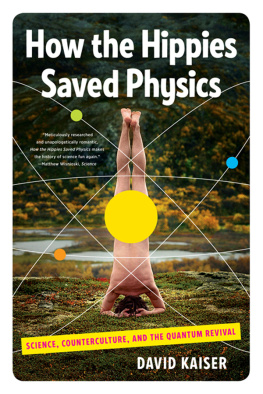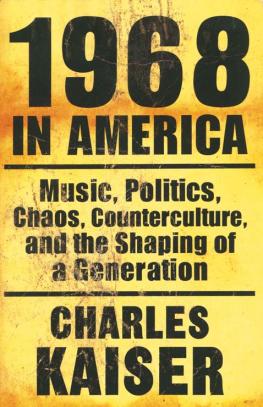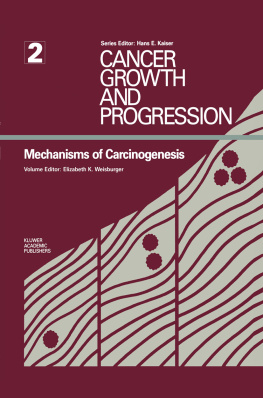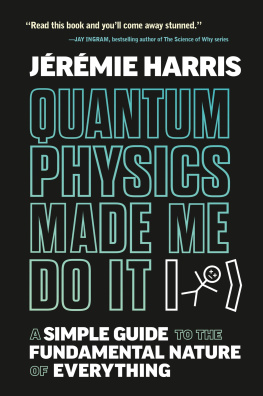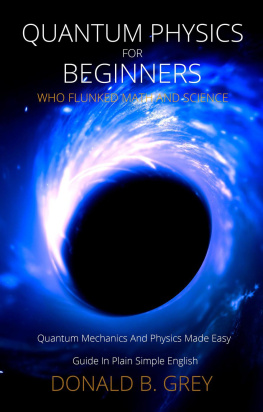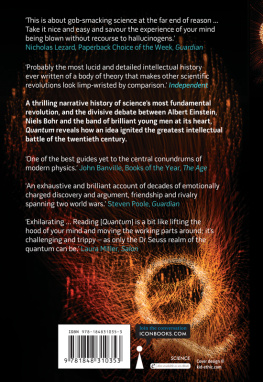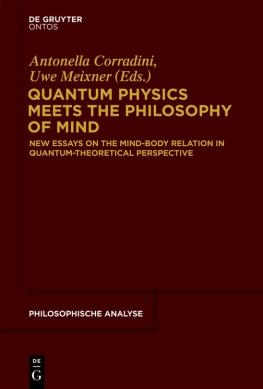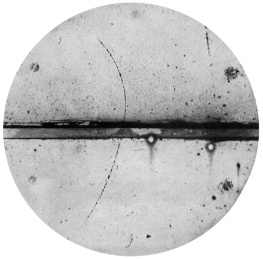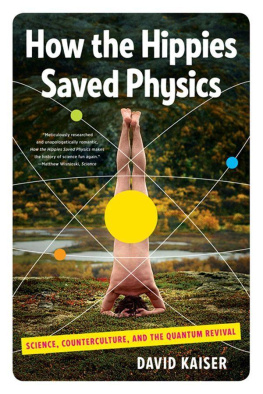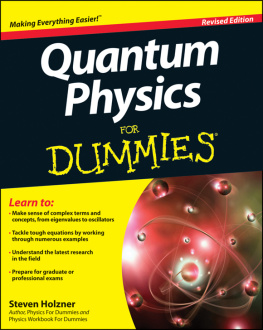Kaiser - How the hippies saved physics science, counterculture, and the quantum revival
Here you can read online Kaiser - How the hippies saved physics science, counterculture, and the quantum revival full text of the book (entire story) in english for free. Download pdf and epub, get meaning, cover and reviews about this ebook. City: Vancouver;BC, year: 2011;2015, publisher: W. W. Norton & Company; Crane Library, genre: Romance novel. Description of the work, (preface) as well as reviews are available. Best literature library LitArk.com created for fans of good reading and offers a wide selection of genres:
Romance novel
Science fiction
Adventure
Detective
Science
History
Home and family
Prose
Art
Politics
Computer
Non-fiction
Religion
Business
Children
Humor
Choose a favorite category and find really read worthwhile books. Enjoy immersion in the world of imagination, feel the emotions of the characters or learn something new for yourself, make an fascinating discovery.
- Book:How the hippies saved physics science, counterculture, and the quantum revival
- Author:
- Publisher:W. W. Norton & Company; Crane Library
- Genre:
- Year:2011;2015
- City:Vancouver;BC
- Rating:3 / 5
- Favourites:Add to favourites
- Your mark:
- 60
- 1
- 2
- 3
- 4
- 5
How the hippies saved physics science, counterculture, and the quantum revival: summary, description and annotation
We offer to read an annotation, description, summary or preface (depends on what the author of the book "How the hippies saved physics science, counterculture, and the quantum revival" wrote himself). If you haven't found the necessary information about the book — write in the comments, we will try to find it.
How the hippies saved physics science, counterculture, and the quantum revival — read online for free the complete book (whole text) full work
Below is the text of the book, divided by pages. System saving the place of the last page read, allows you to conveniently read the book "How the hippies saved physics science, counterculture, and the quantum revival" online for free, without having to search again every time where you left off. Put a bookmark, and you can go to the page where you finished reading at any time.
Font size:
Interval:
Bookmark:
SCIENCE, COUNTERCULTURE, AND THE QUANTUM REVIVAL
W. W. Norton & Company
NEW YORK LONDON
Grateful acknowledgment is made to the following for permission to reprint material: to Zane Kesey and the estate of Dr. Timothy Leary for permission to reprint the epigraph on p. vii, which originally appeared in Timothy Leary, Preface, Spit in the Ocean 3 (Fall, 1977): 811; to Jack Sarfatti and Taylor & Francis, Ltd., for permission to reprint the epigraph to chapter 4, which originally appeared in Jack Sarfatti, Implications of meta-physics for psychoenergetic systems, Psychoenergetic Systems 1 (1974): 38; and to the Melanie Jackson Agency, LLC, for permission to reprint quotations from the Richard P. Feynman papers.
Copyright 2011 by David Kaiser
All rights reserved
Printed in the United States of America
First published as a Norton paperback 2012
For information about permission to reproduce selections from this book, write to Permissions, W. W. Norton & Company, Inc.,
500 Fifth Avenue, New York, NY 10110
For information about special discounts for bulk purchases, please contact W. W. Norton Special Sales at specialsales@wwnorton.com or 800-233-4830
Manufacturing by RR Donnelley, Harrisonburg
Book design by Mark Melnik
Production manager: Devon Zahn
Library of Congress Cataloging-in-Publication Data
Kaiser, David
How the hippies saved physics: science, counterculture, and the quantum revival / David Kaiser.
p. cm.
Includes bibliographical references and index.
ISBN 978-0-393-07636-3 (hardcover)
1. PhysicistsCaliforniaBerkeleyBiography.
2. Quantum theory. 3. Counterculture.
I. Fundamental Fysiks Group (Berkeley, Calif.) II. Title.
QC15.K26 2011
530.092'279467dc22
2010053415
ISBN 978-0-393-34231-4 pbk.
W. W. Norton & Company, Inc.
500 Fifth Avenue, New York, N.Y. 10110
www.wwnorton.com
W. W. Norton & Company Ltd.
Castle House, 75/76 Wells Street, London W1T 3QT
1 2 3 4 5 6 7 8 9 0
More Praise for

Kaiser uncovers a ragtag band of scientists.... Science has never been more unpredictableor more entertaining!
Bryce Christensen,
Booklist , starred review
Kaiser is a master storyteller, a very good physicist, and a fine historian. The book is dazzlingly researched.... Kaisers narration of the physics he presents is accurate and accessible.
Silvan Schweber,
Physics Today
Entertaining.... A curious and largely forgotten episode in the history of physics.
Marcus Chown, New Scientist
Interspersing entertaining anecdotes with explanations of concepts in quantum physics, Kaisers book can be read on many levels. At its most challenging, it is an intellectual history of quantum mechanics. But it is also a yarn about an eccentric group of physicists who refused to be defeated by their marginalization within their own discipline. And, as social history, it offers a window onto one of the most colourful periods of twentieth-century U.S. history.
Hugh Gusterson, Nature
Readers will enjoy this entertaining chronicle of colorful young scientists whose sweeping curiosity turned up no hard evidence for psychic phenomena but led to new ways of looking into the equally bizarre quantum world.
Kirkus Reviews , starred review
Kaisers style is engaging, which makes this history of the time when physics left the short-sleeved white shirts, skinny ties and plastic pocket protectors behind one of the best science books of the year.
Kel Munger, Sacramento News & Review
Exhaustively and carefully researched. [Kaiser] has uncovered a wealth of revealing detail about the various physicists involved, making for a very lively tale.... Fascinating.
Peter Woit, American Science
A remarkably accessible sub-atomic joyride to distant realms of knowledge where the deepest secrets of physics reside.
Chris Bergeron, Metro West Daily News
An entertaining historical peek into the nature of the creative process.
Aaron W. Hughey, Bowling Green Daily News
[A] wonderful book about the expansion of awareness and the broadening of disciplinary scope.
Cyrus C. M. Mody,
Social Studies of Science
There is much to be commended in this likeable history of an idio-syncratic recent period in science.
Doug Johnstone,
Independent (UK)
This entertaining, worthwhile read is as much about the nature of society at the dawn of the New Age as it is about quantum physics.
C. G. Wood, Choice
Here is a book that is immensely fun to read, gives insight into deep and increasingly consequential questions of physics, and transports the reader back into the heart of North Beach zaniness in the long 1960s. Put down your calculators and pick up this book!
Peter Galison, author of Einsteins Clocks, Poincars Maps
A tremendously fun and eye-opening tale.
Ken Alder, author of
The Measure of All Things
David Kaisers masterly ability to explain the most subtle and counterintuitive quantum effects, together with his ability to spin a ripping good yarn, make him the perfect guide to this far-off and far-out era of scientific wackiness.
Seth Lloyd, author of
Programming the Universe
An unconventional view of some unconventional people engaged early in the fundamentals of quantum theory. Great fun to read.
Anton Zeilinger, author of Dance of the Photons
A mind-bending trip to the far horizons of science.
Fred Turner,
author of From Counterculture to Cyberculture
David Kaiser shows us the wonder, mystery, and joy of the scientific pursuit that helped define, and inspire, a particular moment within the counterculture.
Jeffrey J. Kripal, author of
Esalen: America and the Religion of No Religion
To the memory of my father, Richard A. Kaiser.
He was no hippie.
There must be thousands of young persons whose nervous systems were expanded and opened-up in the 1960s and who have now reached positions of competence in the sciences. We expect the new wave of turned-on young mathematicians, physicists, and astronomers are more able to use their energized nervous systems as tools to provide new correlations between psychology and science.
Timothy Leary, 1977
T o most residents of Vienna, April 21, 2004, probably seemed like any other spring day in the Austrian capital. Students mulled over books in cafs; tourists delighted in the Hapsburg-era gardens, museums, and opera houses; and businesspeople scurried through their appointments. Amid the bustle, however, something magical happened. The citys mayor and the director of one of the citys largest banks collaborated on a breathtaking experiment. Working with physicists from the University of Vienna and a spin-off company, the mayor and banker performed the first electronic bank transfer using quantum cryptography. Specially prepared beams of light transmitted an unbreakable codean encryption keybetween the banks branch office and city hall. If anyone else had tried to listen in on the signal, the eavesdropping would have been detected easily and unambiguously. More important, any attempt to breach security would have destroyed the sought-after signal, scrambling it into harmless, random noise. With these safeguards in place, the mayors money wire went through without a hitch.
Three years later, residents of Geneva, Switzerland, participated in a similar feat. Government officials, in cooperation with their own local physicists, employed quantum encryption to protect the transmission of electronic votes cast in the Swiss national election. As in Vienna, the communications remained perfectly secure. The laws of physics had made sure of it.
Font size:
Interval:
Bookmark:
Similar books «How the hippies saved physics science, counterculture, and the quantum revival»
Look at similar books to How the hippies saved physics science, counterculture, and the quantum revival. We have selected literature similar in name and meaning in the hope of providing readers with more options to find new, interesting, not yet read works.
Discussion, reviews of the book How the hippies saved physics science, counterculture, and the quantum revival and just readers' own opinions. Leave your comments, write what you think about the work, its meaning or the main characters. Specify what exactly you liked and what you didn't like, and why you think so.

